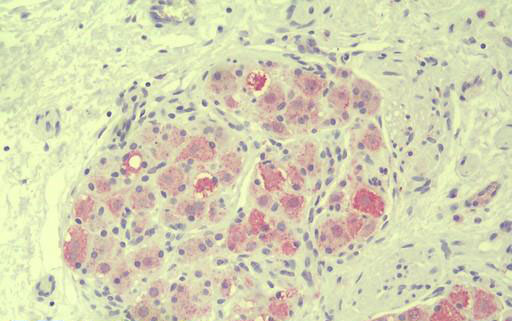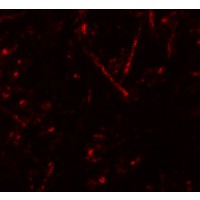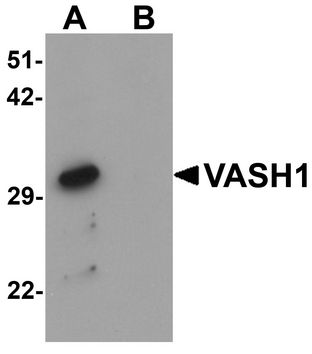Vasohibin 1 / VASH1 Antibody (C-Terminus)
Rabbit Polyclonal Antibody
- SPECIFICATION
- CITATIONS
- PROTOCOLS
- BACKGROUND

Application
| WB, IHC-P, IF, E |
|---|---|
| Primary Accession | Q7L8A9 |
| Other Accession | 22846 |
| Reactivity | Human, Mouse, Rat |
| Host | Rabbit |
| Clonality | Polyclonal |
| Calculated MW | 40957 Da |
| Dilution | IF (20 µg/ml), IHC-P (10 µg/ml), WB (1 - 2 µg/ml), |
| Gene ID | 22846 |
|---|---|
| Other Names | VASH1, KIAA1036, VASH, Vasohibin 1, Vasohibin-1 |
| Target/Specificity | Human VASH1. VASH1 antibody is predicted to not cross-react with other vasohibin protein family members. At least two isoforms are known to exist; this antibody will recognize only the long isoform. |
| Reconstitution & Storage | PBS, 0.02% sodium azide. Short term 4°C, long term aliquot and store at -20°C, avoid freeze thaw cycles. Store undiluted. |
| Precautions | Vasohibin 1 / VASH1 Antibody (C-Terminus) is for research use only and not for use in diagnostic or therapeutic procedures. |
| Name | VASH1 (HGNC:19964) |
|---|---|
| Function | Tyrosine carboxypeptidase that removes the C-terminal tyrosine residue of alpha-tubulin, thereby regulating microtubule dynamics and function (PubMed:29146869, PubMed:31270470, PubMed:31235910, PubMed:31171830, PubMed:31235911). Critical for spindle function and accurate chromosome segregation during mitosis since microtubule detyronisation regulates mitotic spindle length and postioning (PubMed:31171830). Acts as an angiogenesis inhibitor: inhibits migration, proliferation and network formation by endothelial cells as well as angiogenesis (PubMed:15467828, PubMed:16488400, PubMed:16707096, PubMed:19204325). This inhibitory effect is selective to endothelial cells as it does not affect the migration of smooth muscle cells or fibroblasts (PubMed:15467828, PubMed:16488400, PubMed:16707096). |
| Cellular Location | Cytoplasm. Secreted. Note=Mainly localizes in the cytoplasm (PubMed:27879017). Some fraction is secreted via a non-canonical secretion system; interaction with SVBP promotes secretion (PubMed:27879017). |
| Tissue Location | Preferentially expressed in endothelial cells (PubMed:15467828, PubMed:16707096). Highly expressed in fetal organs (PubMed:15467828). Expressed in brain and placenta, and at lower level in heart and kidney (PubMed:15467828). Highly detected in microvessels endothelial cells of atherosclerotic lesions (PubMed:16707096) |

Thousands of laboratories across the world have published research that depended on the performance of antibodies from Abcepta to advance their research. Check out links to articles that cite our products in major peer-reviewed journals, organized by research category.
info@abcepta.com, and receive a free "I Love Antibodies" mug.
Provided below are standard protocols that you may find useful for product applications.
Background
Angiogenesis inhibitor. Inhibits migration, proliferation and network formation by endothelial cells as well as angiogenesis. This inhibitory effect is selective to endothelial cells as it does not affect the migration of smooth muscle cells or fibroblasts. Does not affect the proliferation of cancer cells in vitro, but inhibits tumor growth and tumor angiogenesis. Acts in an autocrine manner. Inhibits artery neointimal formation and macrophage infiltration. Exhibits heparin-binding activity.
References
Kikuno R.,et al.DNA Res. 6:197-205(1999).
Bechtel S.,et al.BMC Genomics 8:399-399(2007).
Heilig R.,et al.Nature 421:601-607(2003).
Watanabe K.,et al.J. Clin. Invest. 114:898-907(2004).
Shimizu K.,et al.Biochem. Biophys. Res. Commun. 327:700-706(2005).
If you have used an Abcepta product and would like to share how it has performed, please click on the "Submit Review" button and provide the requested information. Our staff will examine and post your review and contact you if needed.
If you have any additional inquiries please email technical services at tech@abcepta.com.













 Foundational characteristics of cancer include proliferation, angiogenesis, migration, evasion of apoptosis, and cellular immortality. Find key markers for these cellular processes and antibodies to detect them.
Foundational characteristics of cancer include proliferation, angiogenesis, migration, evasion of apoptosis, and cellular immortality. Find key markers for these cellular processes and antibodies to detect them. The SUMOplot™ Analysis Program predicts and scores sumoylation sites in your protein. SUMOylation is a post-translational modification involved in various cellular processes, such as nuclear-cytosolic transport, transcriptional regulation, apoptosis, protein stability, response to stress, and progression through the cell cycle.
The SUMOplot™ Analysis Program predicts and scores sumoylation sites in your protein. SUMOylation is a post-translational modification involved in various cellular processes, such as nuclear-cytosolic transport, transcriptional regulation, apoptosis, protein stability, response to stress, and progression through the cell cycle. The Autophagy Receptor Motif Plotter predicts and scores autophagy receptor binding sites in your protein. Identifying proteins connected to this pathway is critical to understanding the role of autophagy in physiological as well as pathological processes such as development, differentiation, neurodegenerative diseases, stress, infection, and cancer.
The Autophagy Receptor Motif Plotter predicts and scores autophagy receptor binding sites in your protein. Identifying proteins connected to this pathway is critical to understanding the role of autophagy in physiological as well as pathological processes such as development, differentiation, neurodegenerative diseases, stress, infection, and cancer.




